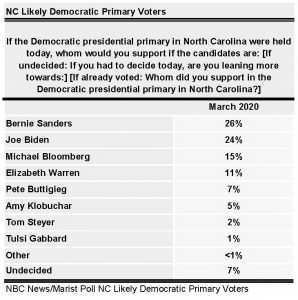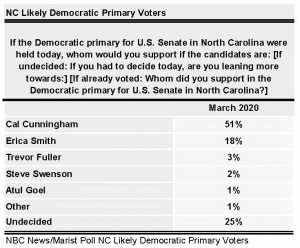March 1, 2020
North Carolina Primaries, March 2020
NBC News/Marist Poll
Sanders and Biden Neck and Neck in North Carolina.
In the North Carolina presidential primary for the Democratic nomination, Bernie Sanders (26%) and Joe Biden (24%) are closely matched among likely Democratic primary voters including those who are undecided yet leaning toward a candidate or who have already voted. Michael Bloomberg receives 15%. Warren (11%) is the only other candidate in the field who receives double-digit support. 22% of likely Democratic primary voters are persuadable, that is, those who are undecided or who may change their minds prior to the primary.

“North Carolina is a tossup between Sanders and Biden for Super Tuesday,” says Dr. Lee M. Miringoff, Director of The Marist College Institute for Public Opinion. “It is also a state that could very well be in play for its electoral votes in November as both of these Democrats run competitively against President Trump among registered voters at this point.”
Biden (28%) and Sanders (26%) are in a tight battle for likely Democratic primary voters who identify as Democrats while Sanders (29%) leads Bloomberg (17%) and Biden (15%) among independents.
Biden (35%) has a 17-point lead over Bloomberg (18%) among likely Democratic primary voters who self-identify as moderate. Sanders receives 14% support among this group. Among African Americans, Biden (36%) is +12 points over Sanders (24%). Bloomberg has the support of 17% of African Americans likely to vote in the primary. Although narrower, Biden (27%) is also ahead among likely Democratic primary voters who are age 45 or older. Bloomberg receives 18% of the older vote, and Sanders garners 16%.
In contrast, Sanders (43%) outpaces Warren (16%), Biden (15%), and Bloomberg (12%) among those who consider themselves to be progressive. Sanders (43%) also outdistances Biden (18%) and Warren (13%) among likely Democratic primary voters in North Carolina under the age of 45. Half of Millennials and Gen Z likely to cast a ballot in the Democratic primary support Sanders. Among white voters, Sanders is also ahead. He receives 26% to 17% for Biden and 16% for Bloomberg.
53% of likely Democratic primary voters with a candidate preference including those who already voted say they strongly support their choice of candidate. Sanders’ supporters (61%) and Biden’s supporters (58%) are more enthusiastic about their choice of candidate than are backers of Bloomberg (47%).
48% of likely Democratic primary voters in North Carolina say it is more important that their party’s nominee is a candidate who has the best chance to defeat President Donald Trump in November rather than one who aligns with them on the issues (42%). A majority of moderates (53%) report their priority is electability. Progressives divide. 47% think electability is more important, and 45% say a candidate’s positions on the issues are critical.
Biden (31%) leads Bloomberg (18%) and Sanders (17%) among those who value electability. Sanders (37%) has the advantage over Biden (16%), Bloomberg (12%), and Warren (12%) among likely Democratic primary voters who say it is more important that the party’s nominee is closest to them on the issues.
Among likely Republican primary voters including those who are undecided yet leaning toward a candidate or who have already voted, President Trump (93%) obliterates Bill Weld (6%) in Weld’s primary challenge to the president. 86% of likely Republican primary voters with a choice of candidate say they strongly support their candidate in the presidential primary.
North Carolina residents divide about Trump’s job performance as president. 44% of adults statewide approve of how Trump is doing his job, including 30% who strongly do so. 47% of North Carolinians disapprove, including 37% of residents who strongly disapprove. A plurality of independents (48%) also disapprove of how the president is performing in office.
Both Biden and Sanders are competitive against Trump in hypothetical general election matchups. Biden receives 49% to 45% for Trump among North Carolina registered voters. Sanders garners 48% to 46% for the president. Trump carried the state by 4 points in 2016 against Hillary Clinton.

In each of these hypothetical contests, Trump bests Sanders and Biden among men and white voters. Trump receives more than twice the support against each of them among white voters without a college degree. Among men who live in small cities and suburbs, Trump (50%) is ahead of Sanders (44%) by 6 points. Trump (50%) edges Biden (47%) among these voters by 3 points.
Biden and Sanders best Trump among African American voters, women, including about six in ten women who live in small cities and the suburbs, and voters under the age of 45. Registered voters in North Carolina who are age 45 or older divide. Trump (47%) is +2 percentage points against Sanders (45%), and Biden (48%) is +1 over Trump (47%).
Of note, Trump (50%) is +6 points over Sanders (44%) among white voters with a college education. Biden (48%) and Trump (47%) split the support of this group.
46% of North Carolina registered voters say they prefer a Congress controlled by Democrats as a result of November’s elections. 42% favor a Republican-controlled Congress, and 12% are unsure. Among independents, 40% say they want the Democrats in control, 38% prefer the Republicans in the majority, and a notable 21% of independents are unsure.
In the Democratic primary for U.S. Senate, Cal Cunningham (51%) has majority support and leads his closest competitor, Erica Smith (18%), by 33 percentage points among likely Democratic primary voters including those who are undecided yet leaning toward a candidate or have already voted. No other candidate has double-digit support. One in four North Carolina Democrats likely to cast a ballot in the Senate primary (25%) are undecided. 50% of likely Democratic primary voters with a candidate preference for U.S. Senate strongly support their choice of candidate.

In a hypothetical general election matchup between Cunningham and Republican incumbent Thom Tillis, Cunningham (48%) is ahead of Tillis (43%) by 5 points among registered voters in North Carolina. Tillis narrowly defeated incumbent Senator Kay Hagan in 2014.

